Theory to Practice: Psychological Analysis of Leah Smith Case Study
VerifiedAdded on 2023/06/03
|8
|2395
|319
Case Study
AI Summary
This case study analysis focuses on Leah Smith, a 33-year-old woman experiencing marital issues and personal distress. The analysis applies psychological theories, specifically cognitive, behavioral, and personality psychology, to understand her situation. It justifies the use of these theories by highlighting their relevance to Leah's internal motivations, decision-making abilities, and overall personality. The implementation of these theories suggests strategies for Leah to manage her emotions, improve her relationships, and address her personal challenges. The study concludes by emphasizing the importance of psychological theories in providing a framework for understanding and addressing complex human behaviors and emotions.
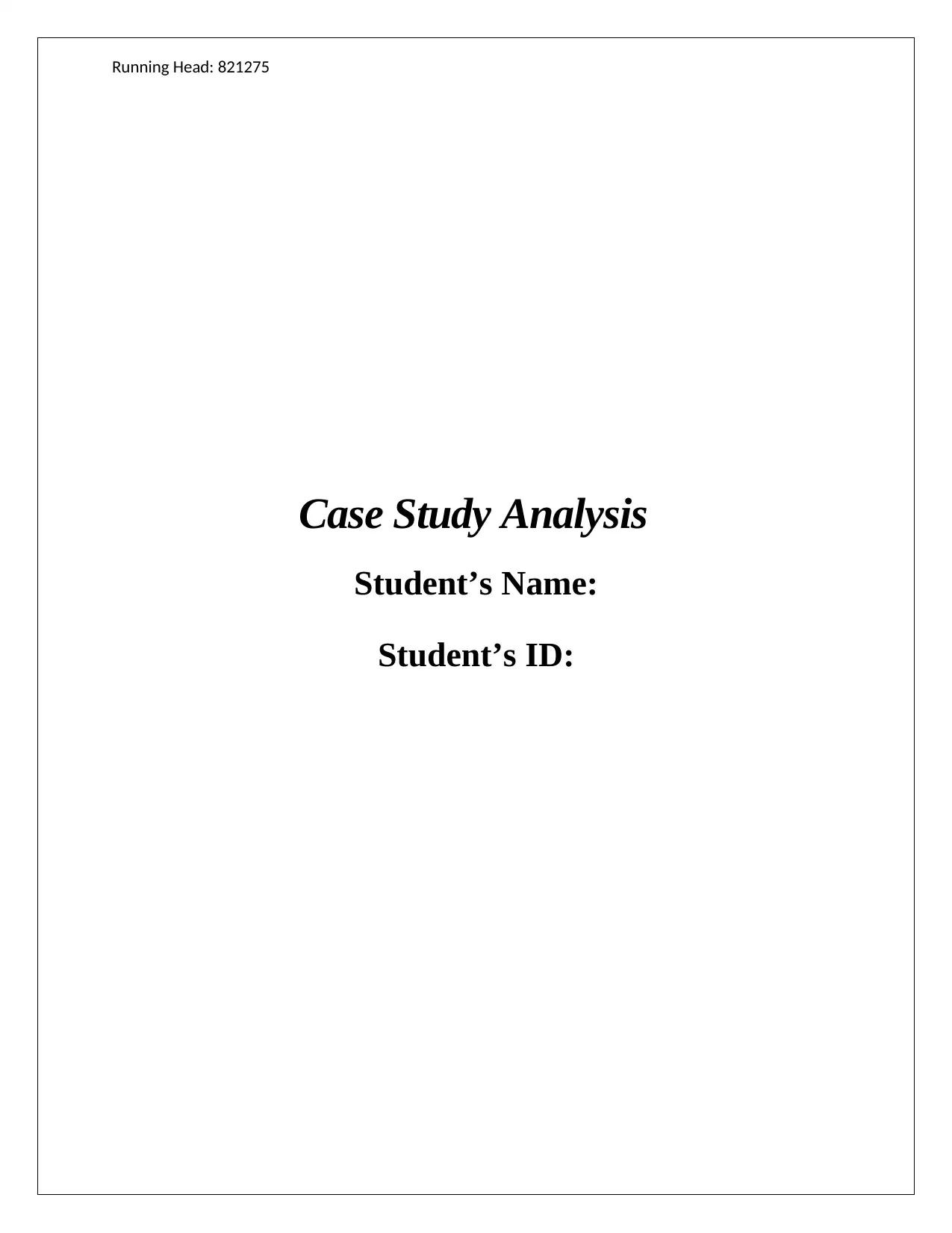
Running Head: 821275
Case Study Analysis
Student’s Name:
Student’s ID:
Case Study Analysis
Student’s Name:
Student’s ID:
Paraphrase This Document
Need a fresh take? Get an instant paraphrase of this document with our AI Paraphraser
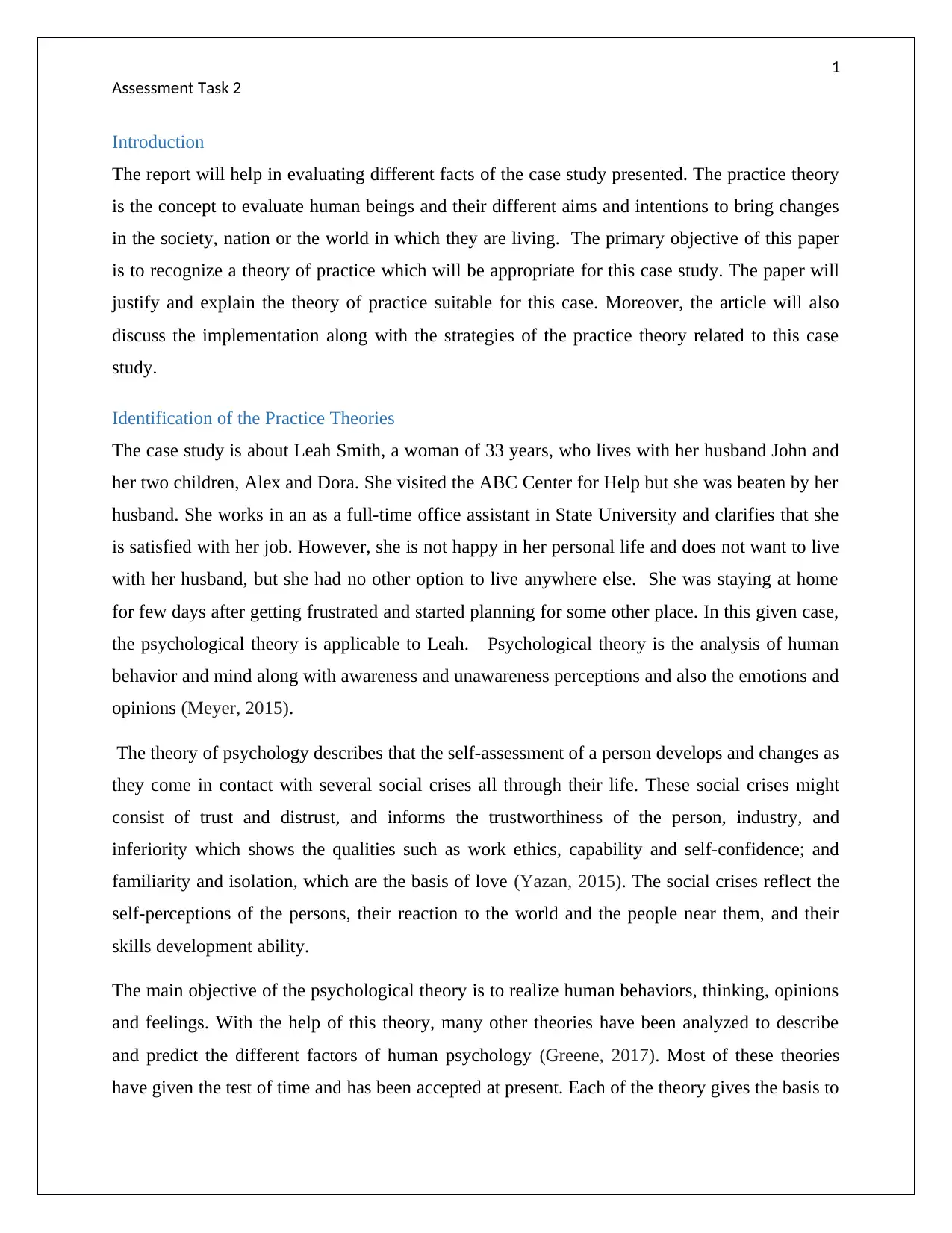
1
Assessment Task 2
Introduction
The report will help in evaluating different facts of the case study presented. The practice theory
is the concept to evaluate human beings and their different aims and intentions to bring changes
in the society, nation or the world in which they are living. The primary objective of this paper
is to recognize a theory of practice which will be appropriate for this case study. The paper will
justify and explain the theory of practice suitable for this case. Moreover, the article will also
discuss the implementation along with the strategies of the practice theory related to this case
study.
Identification of the Practice Theories
The case study is about Leah Smith, a woman of 33 years, who lives with her husband John and
her two children, Alex and Dora. She visited the ABC Center for Help but she was beaten by her
husband. She works in an as a full-time office assistant in State University and clarifies that she
is satisfied with her job. However, she is not happy in her personal life and does not want to live
with her husband, but she had no other option to live anywhere else. She was staying at home
for few days after getting frustrated and started planning for some other place. In this given case,
the psychological theory is applicable to Leah. Psychological theory is the analysis of human
behavior and mind along with awareness and unawareness perceptions and also the emotions and
opinions (Meyer, 2015).
The theory of psychology describes that the self-assessment of a person develops and changes as
they come in contact with several social crises all through their life. These social crises might
consist of trust and distrust, and informs the trustworthiness of the person, industry, and
inferiority which shows the qualities such as work ethics, capability and self-confidence; and
familiarity and isolation, which are the basis of love (Yazan, 2015). The social crises reflect the
self-perceptions of the persons, their reaction to the world and the people near them, and their
skills development ability.
The main objective of the psychological theory is to realize human behaviors, thinking, opinions
and feelings. With the help of this theory, many other theories have been analyzed to describe
and predict the different factors of human psychology (Greene, 2017). Most of these theories
have given the test of time and has been accepted at present. Each of the theory gives the basis to
Assessment Task 2
Introduction
The report will help in evaluating different facts of the case study presented. The practice theory
is the concept to evaluate human beings and their different aims and intentions to bring changes
in the society, nation or the world in which they are living. The primary objective of this paper
is to recognize a theory of practice which will be appropriate for this case study. The paper will
justify and explain the theory of practice suitable for this case. Moreover, the article will also
discuss the implementation along with the strategies of the practice theory related to this case
study.
Identification of the Practice Theories
The case study is about Leah Smith, a woman of 33 years, who lives with her husband John and
her two children, Alex and Dora. She visited the ABC Center for Help but she was beaten by her
husband. She works in an as a full-time office assistant in State University and clarifies that she
is satisfied with her job. However, she is not happy in her personal life and does not want to live
with her husband, but she had no other option to live anywhere else. She was staying at home
for few days after getting frustrated and started planning for some other place. In this given case,
the psychological theory is applicable to Leah. Psychological theory is the analysis of human
behavior and mind along with awareness and unawareness perceptions and also the emotions and
opinions (Meyer, 2015).
The theory of psychology describes that the self-assessment of a person develops and changes as
they come in contact with several social crises all through their life. These social crises might
consist of trust and distrust, and informs the trustworthiness of the person, industry, and
inferiority which shows the qualities such as work ethics, capability and self-confidence; and
familiarity and isolation, which are the basis of love (Yazan, 2015). The social crises reflect the
self-perceptions of the persons, their reaction to the world and the people near them, and their
skills development ability.
The main objective of the psychological theory is to realize human behaviors, thinking, opinions
and feelings. With the help of this theory, many other theories have been analyzed to describe
and predict the different factors of human psychology (Greene, 2017). Most of these theories
have given the test of time and has been accepted at present. Each of the theory gives the basis to
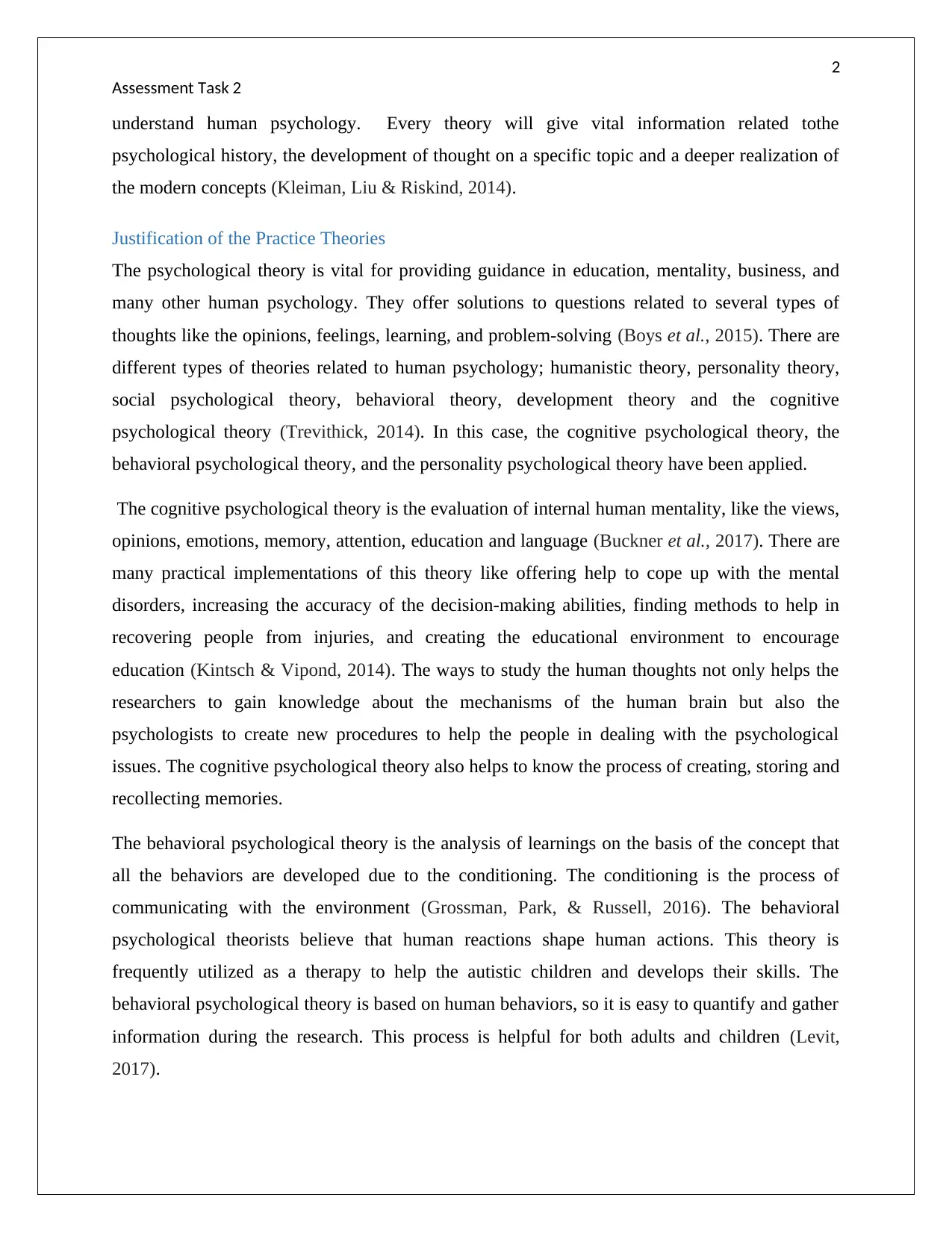
2
Assessment Task 2
understand human psychology. Every theory will give vital information related tothe
psychological history, the development of thought on a specific topic and a deeper realization of
the modern concepts (Kleiman, Liu & Riskind, 2014).
Justification of the Practice Theories
The psychological theory is vital for providing guidance in education, mentality, business, and
many other human psychology. They offer solutions to questions related to several types of
thoughts like the opinions, feelings, learning, and problem-solving (Boys et al., 2015). There are
different types of theories related to human psychology; humanistic theory, personality theory,
social psychological theory, behavioral theory, development theory and the cognitive
psychological theory (Trevithick, 2014). In this case, the cognitive psychological theory, the
behavioral psychological theory, and the personality psychological theory have been applied.
The cognitive psychological theory is the evaluation of internal human mentality, like the views,
opinions, emotions, memory, attention, education and language (Buckner et al., 2017). There are
many practical implementations of this theory like offering help to cope up with the mental
disorders, increasing the accuracy of the decision-making abilities, finding methods to help in
recovering people from injuries, and creating the educational environment to encourage
education (Kintsch & Vipond, 2014). The ways to study the human thoughts not only helps the
researchers to gain knowledge about the mechanisms of the human brain but also the
psychologists to create new procedures to help the people in dealing with the psychological
issues. The cognitive psychological theory also helps to know the process of creating, storing and
recollecting memories.
The behavioral psychological theory is the analysis of learnings on the basis of the concept that
all the behaviors are developed due to the conditioning. The conditioning is the process of
communicating with the environment (Grossman, Park, & Russell, 2016). The behavioral
psychological theorists believe that human reactions shape human actions. This theory is
frequently utilized as a therapy to help the autistic children and develops their skills. The
behavioral psychological theory is based on human behaviors, so it is easy to quantify and gather
information during the research. This process is helpful for both adults and children (Levit,
2017).
Assessment Task 2
understand human psychology. Every theory will give vital information related tothe
psychological history, the development of thought on a specific topic and a deeper realization of
the modern concepts (Kleiman, Liu & Riskind, 2014).
Justification of the Practice Theories
The psychological theory is vital for providing guidance in education, mentality, business, and
many other human psychology. They offer solutions to questions related to several types of
thoughts like the opinions, feelings, learning, and problem-solving (Boys et al., 2015). There are
different types of theories related to human psychology; humanistic theory, personality theory,
social psychological theory, behavioral theory, development theory and the cognitive
psychological theory (Trevithick, 2014). In this case, the cognitive psychological theory, the
behavioral psychological theory, and the personality psychological theory have been applied.
The cognitive psychological theory is the evaluation of internal human mentality, like the views,
opinions, emotions, memory, attention, education and language (Buckner et al., 2017). There are
many practical implementations of this theory like offering help to cope up with the mental
disorders, increasing the accuracy of the decision-making abilities, finding methods to help in
recovering people from injuries, and creating the educational environment to encourage
education (Kintsch & Vipond, 2014). The ways to study the human thoughts not only helps the
researchers to gain knowledge about the mechanisms of the human brain but also the
psychologists to create new procedures to help the people in dealing with the psychological
issues. The cognitive psychological theory also helps to know the process of creating, storing and
recollecting memories.
The behavioral psychological theory is the analysis of learnings on the basis of the concept that
all the behaviors are developed due to the conditioning. The conditioning is the process of
communicating with the environment (Grossman, Park, & Russell, 2016). The behavioral
psychological theorists believe that human reactions shape human actions. This theory is
frequently utilized as a therapy to help the autistic children and develops their skills. The
behavioral psychological theory is based on human behaviors, so it is easy to quantify and gather
information during the research. This process is helpful for both adults and children (Levit,
2017).
⊘ This is a preview!⊘
Do you want full access?
Subscribe today to unlock all pages.

Trusted by 1+ million students worldwide
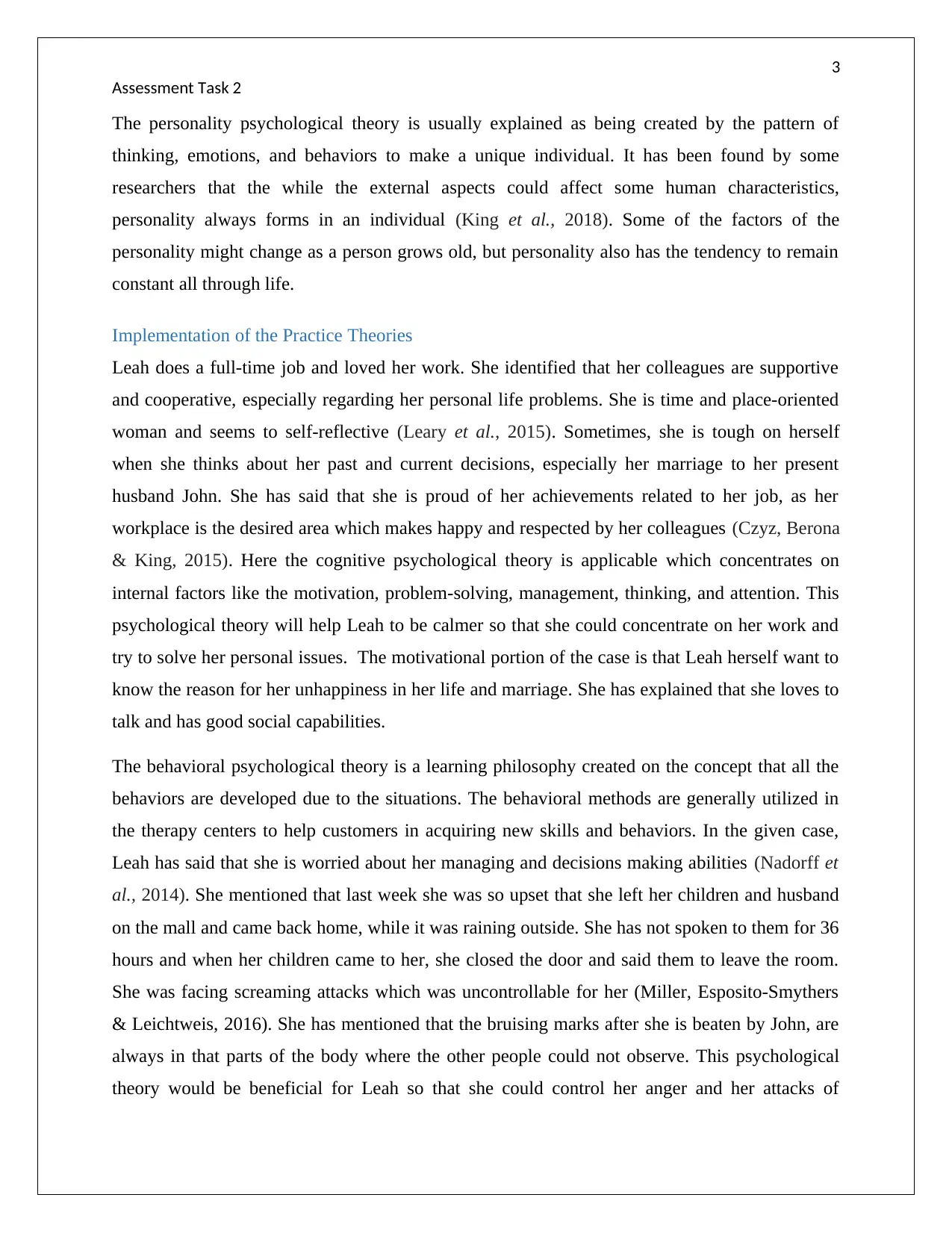
3
Assessment Task 2
The personality psychological theory is usually explained as being created by the pattern of
thinking, emotions, and behaviors to make a unique individual. It has been found by some
researchers that the while the external aspects could affect some human characteristics,
personality always forms in an individual (King et al., 2018). Some of the factors of the
personality might change as a person grows old, but personality also has the tendency to remain
constant all through life.
Implementation of the Practice Theories
Leah does a full-time job and loved her work. She identified that her colleagues are supportive
and cooperative, especially regarding her personal life problems. She is time and place-oriented
woman and seems to self-reflective (Leary et al., 2015). Sometimes, she is tough on herself
when she thinks about her past and current decisions, especially her marriage to her present
husband John. She has said that she is proud of her achievements related to her job, as her
workplace is the desired area which makes happy and respected by her colleagues (Czyz, Berona
& King, 2015). Here the cognitive psychological theory is applicable which concentrates on
internal factors like the motivation, problem-solving, management, thinking, and attention. This
psychological theory will help Leah to be calmer so that she could concentrate on her work and
try to solve her personal issues. The motivational portion of the case is that Leah herself want to
know the reason for her unhappiness in her life and marriage. She has explained that she loves to
talk and has good social capabilities.
The behavioral psychological theory is a learning philosophy created on the concept that all the
behaviors are developed due to the situations. The behavioral methods are generally utilized in
the therapy centers to help customers in acquiring new skills and behaviors. In the given case,
Leah has said that she is worried about her managing and decisions making abilities (Nadorff et
al., 2014). She mentioned that last week she was so upset that she left her children and husband
on the mall and came back home, while it was raining outside. She has not spoken to them for 36
hours and when her children came to her, she closed the door and said them to leave the room.
She was facing screaming attacks which was uncontrollable for her (Miller, Esposito‐Smythers
& Leichtweis, 2016). She has mentioned that the bruising marks after she is beaten by John, are
always in that parts of the body where the other people could not observe. This psychological
theory would be beneficial for Leah so that she could control her anger and her attacks of
Assessment Task 2
The personality psychological theory is usually explained as being created by the pattern of
thinking, emotions, and behaviors to make a unique individual. It has been found by some
researchers that the while the external aspects could affect some human characteristics,
personality always forms in an individual (King et al., 2018). Some of the factors of the
personality might change as a person grows old, but personality also has the tendency to remain
constant all through life.
Implementation of the Practice Theories
Leah does a full-time job and loved her work. She identified that her colleagues are supportive
and cooperative, especially regarding her personal life problems. She is time and place-oriented
woman and seems to self-reflective (Leary et al., 2015). Sometimes, she is tough on herself
when she thinks about her past and current decisions, especially her marriage to her present
husband John. She has said that she is proud of her achievements related to her job, as her
workplace is the desired area which makes happy and respected by her colleagues (Czyz, Berona
& King, 2015). Here the cognitive psychological theory is applicable which concentrates on
internal factors like the motivation, problem-solving, management, thinking, and attention. This
psychological theory will help Leah to be calmer so that she could concentrate on her work and
try to solve her personal issues. The motivational portion of the case is that Leah herself want to
know the reason for her unhappiness in her life and marriage. She has explained that she loves to
talk and has good social capabilities.
The behavioral psychological theory is a learning philosophy created on the concept that all the
behaviors are developed due to the situations. The behavioral methods are generally utilized in
the therapy centers to help customers in acquiring new skills and behaviors. In the given case,
Leah has said that she is worried about her managing and decisions making abilities (Nadorff et
al., 2014). She mentioned that last week she was so upset that she left her children and husband
on the mall and came back home, while it was raining outside. She has not spoken to them for 36
hours and when her children came to her, she closed the door and said them to leave the room.
She was facing screaming attacks which was uncontrollable for her (Miller, Esposito‐Smythers
& Leichtweis, 2016). She has mentioned that the bruising marks after she is beaten by John, are
always in that parts of the body where the other people could not observe. This psychological
theory would be beneficial for Leah so that she could control her anger and her attacks of
Paraphrase This Document
Need a fresh take? Get an instant paraphrase of this document with our AI Paraphraser
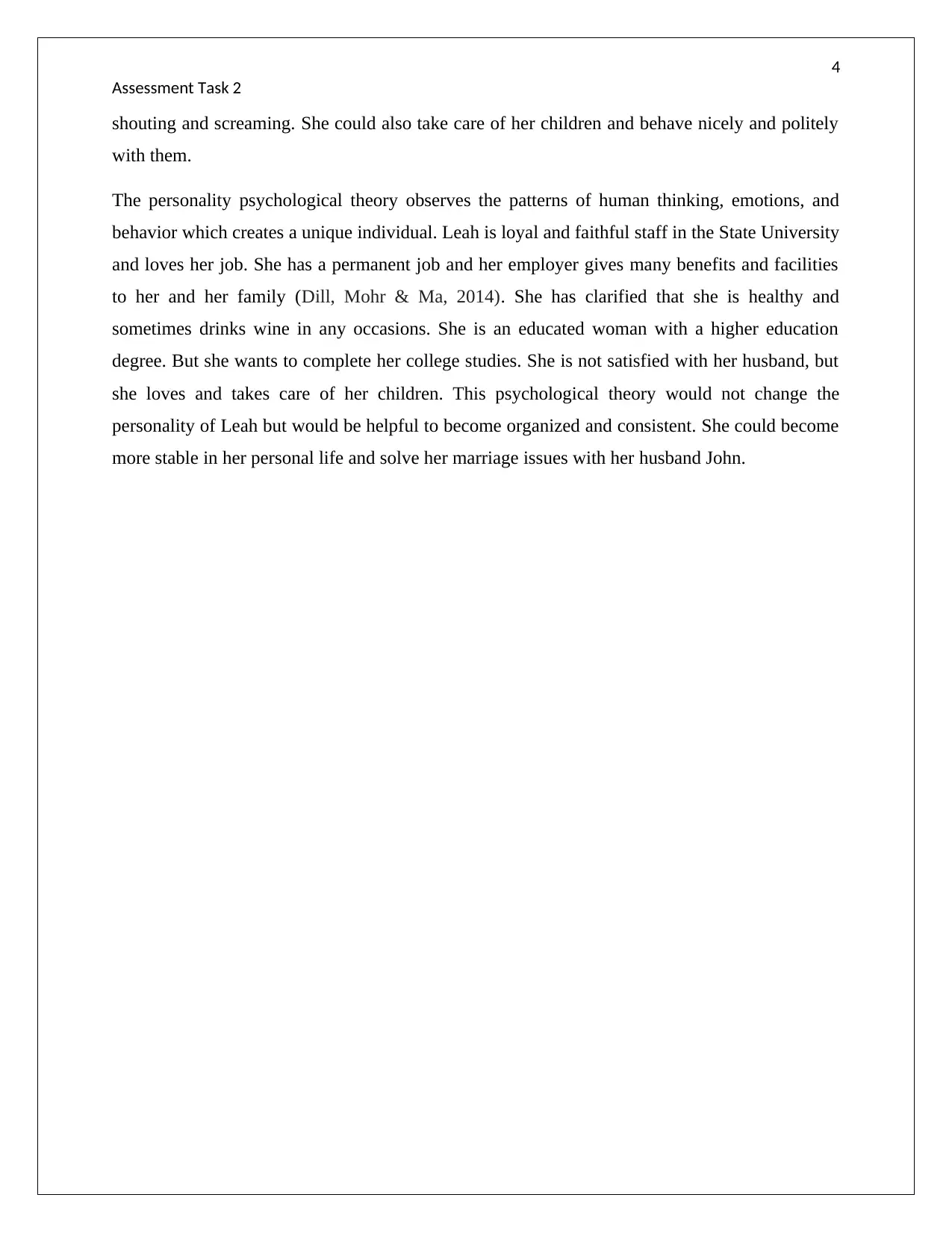
4
Assessment Task 2
shouting and screaming. She could also take care of her children and behave nicely and politely
with them.
The personality psychological theory observes the patterns of human thinking, emotions, and
behavior which creates a unique individual. Leah is loyal and faithful staff in the State University
and loves her job. She has a permanent job and her employer gives many benefits and facilities
to her and her family (Dill, Mohr & Ma, 2014). She has clarified that she is healthy and
sometimes drinks wine in any occasions. She is an educated woman with a higher education
degree. But she wants to complete her college studies. She is not satisfied with her husband, but
she loves and takes care of her children. This psychological theory would not change the
personality of Leah but would be helpful to become organized and consistent. She could become
more stable in her personal life and solve her marriage issues with her husband John.
Assessment Task 2
shouting and screaming. She could also take care of her children and behave nicely and politely
with them.
The personality psychological theory observes the patterns of human thinking, emotions, and
behavior which creates a unique individual. Leah is loyal and faithful staff in the State University
and loves her job. She has a permanent job and her employer gives many benefits and facilities
to her and her family (Dill, Mohr & Ma, 2014). She has clarified that she is healthy and
sometimes drinks wine in any occasions. She is an educated woman with a higher education
degree. But she wants to complete her college studies. She is not satisfied with her husband, but
she loves and takes care of her children. This psychological theory would not change the
personality of Leah but would be helpful to become organized and consistent. She could become
more stable in her personal life and solve her marriage issues with her husband John.
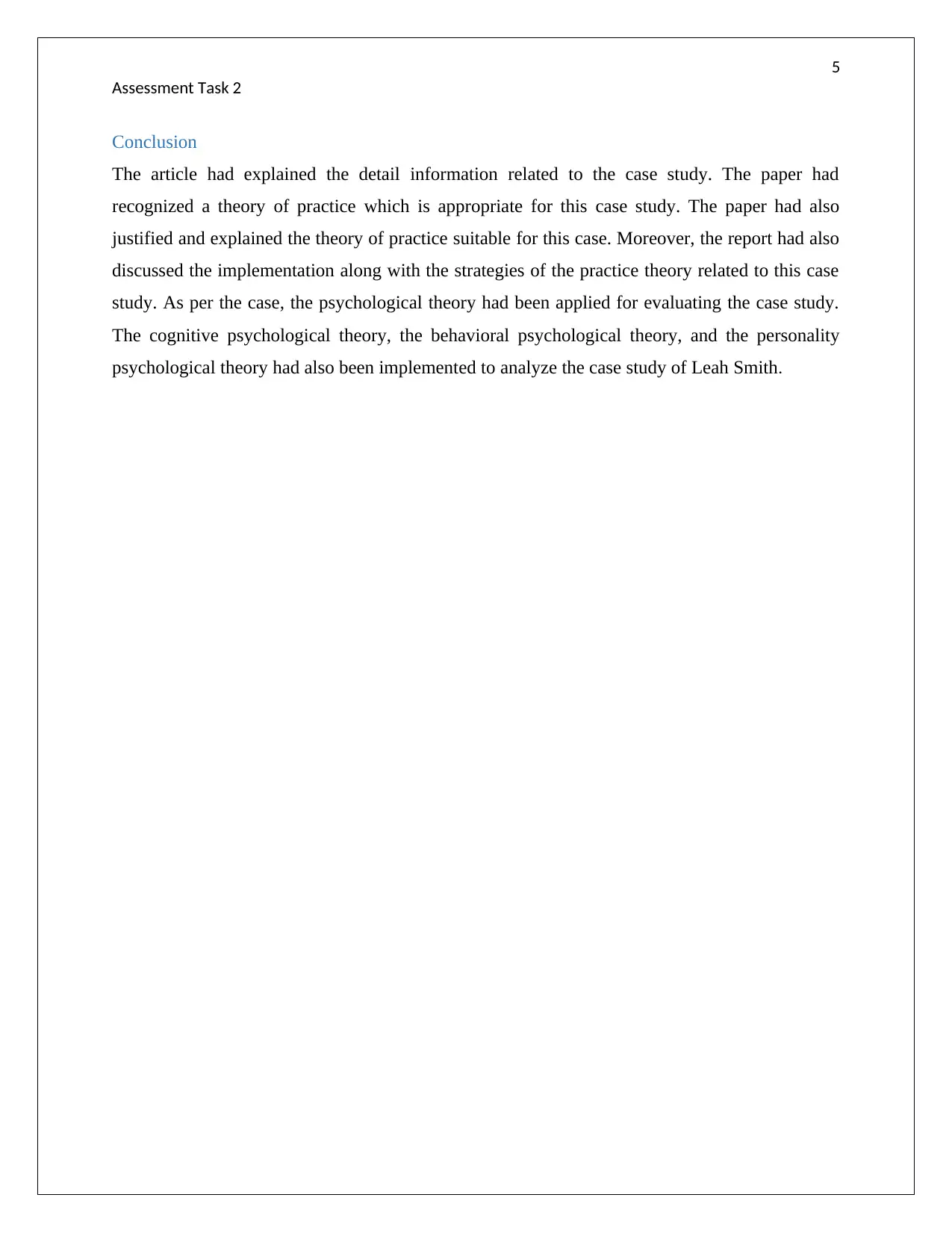
5
Assessment Task 2
Conclusion
The article had explained the detail information related to the case study. The paper had
recognized a theory of practice which is appropriate for this case study. The paper had also
justified and explained the theory of practice suitable for this case. Moreover, the report had also
discussed the implementation along with the strategies of the practice theory related to this case
study. As per the case, the psychological theory had been applied for evaluating the case study.
The cognitive psychological theory, the behavioral psychological theory, and the personality
psychological theory had also been implemented to analyze the case study of Leah Smith.
Assessment Task 2
Conclusion
The article had explained the detail information related to the case study. The paper had
recognized a theory of practice which is appropriate for this case study. The paper had also
justified and explained the theory of practice suitable for this case. Moreover, the report had also
discussed the implementation along with the strategies of the practice theory related to this case
study. As per the case, the psychological theory had been applied for evaluating the case study.
The cognitive psychological theory, the behavioral psychological theory, and the personality
psychological theory had also been implemented to analyze the case study of Leah Smith.
⊘ This is a preview!⊘
Do you want full access?
Subscribe today to unlock all pages.

Trusted by 1+ million students worldwide
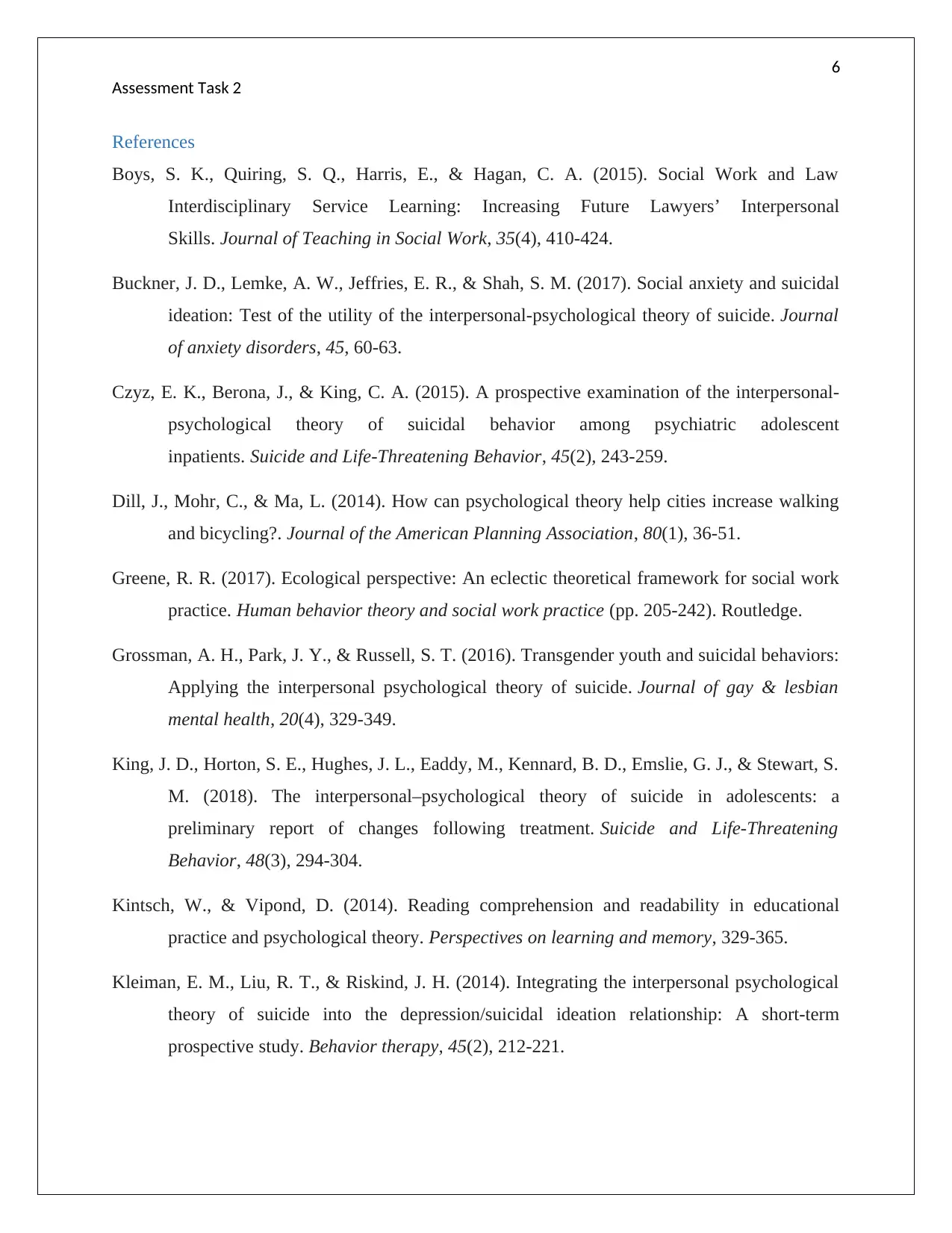
6
Assessment Task 2
References
Boys, S. K., Quiring, S. Q., Harris, E., & Hagan, C. A. (2015). Social Work and Law
Interdisciplinary Service Learning: Increasing Future Lawyers’ Interpersonal
Skills. Journal of Teaching in Social Work, 35(4), 410-424.
Buckner, J. D., Lemke, A. W., Jeffries, E. R., & Shah, S. M. (2017). Social anxiety and suicidal
ideation: Test of the utility of the interpersonal-psychological theory of suicide. Journal
of anxiety disorders, 45, 60-63.
Czyz, E. K., Berona, J., & King, C. A. (2015). A prospective examination of the interpersonal‐
psychological theory of suicidal behavior among psychiatric adolescent
inpatients. Suicide and Life‐Threatening Behavior, 45(2), 243-259.
Dill, J., Mohr, C., & Ma, L. (2014). How can psychological theory help cities increase walking
and bicycling?. Journal of the American Planning Association, 80(1), 36-51.
Greene, R. R. (2017). Ecological perspective: An eclectic theoretical framework for social work
practice. Human behavior theory and social work practice (pp. 205-242). Routledge.
Grossman, A. H., Park, J. Y., & Russell, S. T. (2016). Transgender youth and suicidal behaviors:
Applying the interpersonal psychological theory of suicide. Journal of gay & lesbian
mental health, 20(4), 329-349.
King, J. D., Horton, S. E., Hughes, J. L., Eaddy, M., Kennard, B. D., Emslie, G. J., & Stewart, S.
M. (2018). The interpersonal–psychological theory of suicide in adolescents: a
preliminary report of changes following treatment. Suicide and Life‐Threatening
Behavior, 48(3), 294-304.
Kintsch, W., & Vipond, D. (2014). Reading comprehension and readability in educational
practice and psychological theory. Perspectives on learning and memory, 329-365.
Kleiman, E. M., Liu, R. T., & Riskind, J. H. (2014). Integrating the interpersonal psychological
theory of suicide into the depression/suicidal ideation relationship: A short-term
prospective study. Behavior therapy, 45(2), 212-221.
Assessment Task 2
References
Boys, S. K., Quiring, S. Q., Harris, E., & Hagan, C. A. (2015). Social Work and Law
Interdisciplinary Service Learning: Increasing Future Lawyers’ Interpersonal
Skills. Journal of Teaching in Social Work, 35(4), 410-424.
Buckner, J. D., Lemke, A. W., Jeffries, E. R., & Shah, S. M. (2017). Social anxiety and suicidal
ideation: Test of the utility of the interpersonal-psychological theory of suicide. Journal
of anxiety disorders, 45, 60-63.
Czyz, E. K., Berona, J., & King, C. A. (2015). A prospective examination of the interpersonal‐
psychological theory of suicidal behavior among psychiatric adolescent
inpatients. Suicide and Life‐Threatening Behavior, 45(2), 243-259.
Dill, J., Mohr, C., & Ma, L. (2014). How can psychological theory help cities increase walking
and bicycling?. Journal of the American Planning Association, 80(1), 36-51.
Greene, R. R. (2017). Ecological perspective: An eclectic theoretical framework for social work
practice. Human behavior theory and social work practice (pp. 205-242). Routledge.
Grossman, A. H., Park, J. Y., & Russell, S. T. (2016). Transgender youth and suicidal behaviors:
Applying the interpersonal psychological theory of suicide. Journal of gay & lesbian
mental health, 20(4), 329-349.
King, J. D., Horton, S. E., Hughes, J. L., Eaddy, M., Kennard, B. D., Emslie, G. J., & Stewart, S.
M. (2018). The interpersonal–psychological theory of suicide in adolescents: a
preliminary report of changes following treatment. Suicide and Life‐Threatening
Behavior, 48(3), 294-304.
Kintsch, W., & Vipond, D. (2014). Reading comprehension and readability in educational
practice and psychological theory. Perspectives on learning and memory, 329-365.
Kleiman, E. M., Liu, R. T., & Riskind, J. H. (2014). Integrating the interpersonal psychological
theory of suicide into the depression/suicidal ideation relationship: A short-term
prospective study. Behavior therapy, 45(2), 212-221.
Paraphrase This Document
Need a fresh take? Get an instant paraphrase of this document with our AI Paraphraser
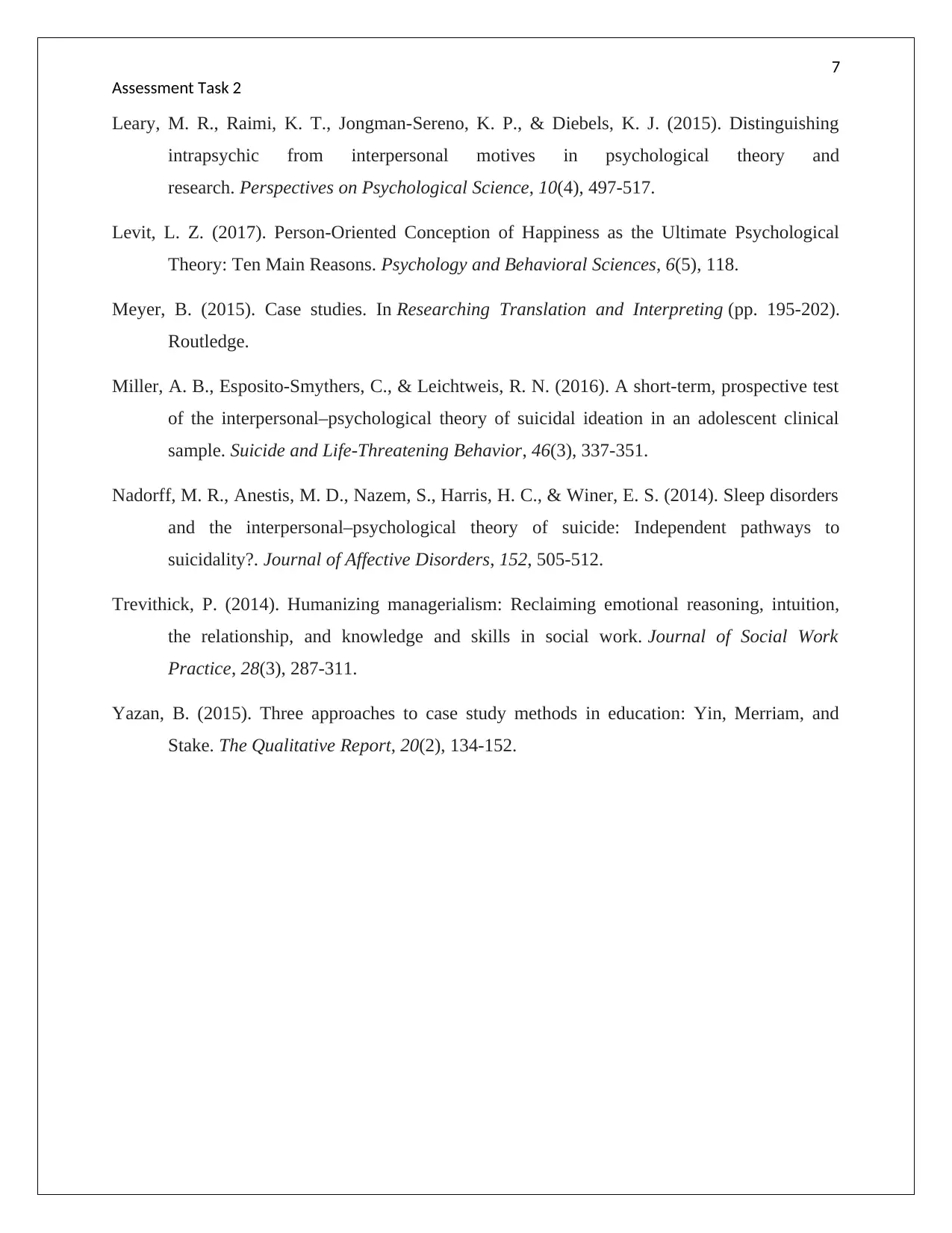
7
Assessment Task 2
Leary, M. R., Raimi, K. T., Jongman-Sereno, K. P., & Diebels, K. J. (2015). Distinguishing
intrapsychic from interpersonal motives in psychological theory and
research. Perspectives on Psychological Science, 10(4), 497-517.
Levit, L. Z. (2017). Person-Oriented Conception of Happiness as the Ultimate Psychological
Theory: Ten Main Reasons. Psychology and Behavioral Sciences, 6(5), 118.
Meyer, B. (2015). Case studies. In Researching Translation and Interpreting (pp. 195-202).
Routledge.
Miller, A. B., Esposito‐Smythers, C., & Leichtweis, R. N. (2016). A short‐term, prospective test
of the interpersonal–psychological theory of suicidal ideation in an adolescent clinical
sample. Suicide and Life‐Threatening Behavior, 46(3), 337-351.
Nadorff, M. R., Anestis, M. D., Nazem, S., Harris, H. C., & Winer, E. S. (2014). Sleep disorders
and the interpersonal–psychological theory of suicide: Independent pathways to
suicidality?. Journal of Affective Disorders, 152, 505-512.
Trevithick, P. (2014). Humanizing managerialism: Reclaiming emotional reasoning, intuition,
the relationship, and knowledge and skills in social work. Journal of Social Work
Practice, 28(3), 287-311.
Yazan, B. (2015). Three approaches to case study methods in education: Yin, Merriam, and
Stake. The Qualitative Report, 20(2), 134-152.
Assessment Task 2
Leary, M. R., Raimi, K. T., Jongman-Sereno, K. P., & Diebels, K. J. (2015). Distinguishing
intrapsychic from interpersonal motives in psychological theory and
research. Perspectives on Psychological Science, 10(4), 497-517.
Levit, L. Z. (2017). Person-Oriented Conception of Happiness as the Ultimate Psychological
Theory: Ten Main Reasons. Psychology and Behavioral Sciences, 6(5), 118.
Meyer, B. (2015). Case studies. In Researching Translation and Interpreting (pp. 195-202).
Routledge.
Miller, A. B., Esposito‐Smythers, C., & Leichtweis, R. N. (2016). A short‐term, prospective test
of the interpersonal–psychological theory of suicidal ideation in an adolescent clinical
sample. Suicide and Life‐Threatening Behavior, 46(3), 337-351.
Nadorff, M. R., Anestis, M. D., Nazem, S., Harris, H. C., & Winer, E. S. (2014). Sleep disorders
and the interpersonal–psychological theory of suicide: Independent pathways to
suicidality?. Journal of Affective Disorders, 152, 505-512.
Trevithick, P. (2014). Humanizing managerialism: Reclaiming emotional reasoning, intuition,
the relationship, and knowledge and skills in social work. Journal of Social Work
Practice, 28(3), 287-311.
Yazan, B. (2015). Three approaches to case study methods in education: Yin, Merriam, and
Stake. The Qualitative Report, 20(2), 134-152.
1 out of 8
Related Documents
Your All-in-One AI-Powered Toolkit for Academic Success.
+13062052269
info@desklib.com
Available 24*7 on WhatsApp / Email
![[object Object]](/_next/static/media/star-bottom.7253800d.svg)
Unlock your academic potential
Copyright © 2020–2026 A2Z Services. All Rights Reserved. Developed and managed by ZUCOL.





